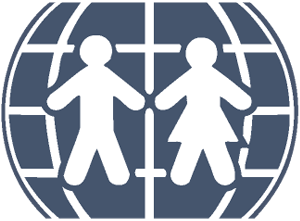World Children’s Fund supports the feeding of more than 1200 children in the west African nation of Liberia. Five days each week children arrive hungry at multiple locations in Buchanan, a rural community located about a three-hour drive from the capital city of Monrovia.
These impoverished children would have empty bellies were it not for the generosity of donors. For most of the children in the program, it is their only consistent food source. The feeding program began in 2008 and has been praised for its impacts. Hungry children previously roamed the outdoor market stalls along the main street of Buchanan grabbing fruits and vegetables from unsuspecting vendors. Children worked all day selling bananas and sticks they collected for firewood or bits of charcoal to sell. Without food to sustain them, children in Buchanan and other areas in this impoverished nation must devote all their time and energy finding food to survive. Now, these children have hope. It arrives each day on a plate filled with hot nutritious food.
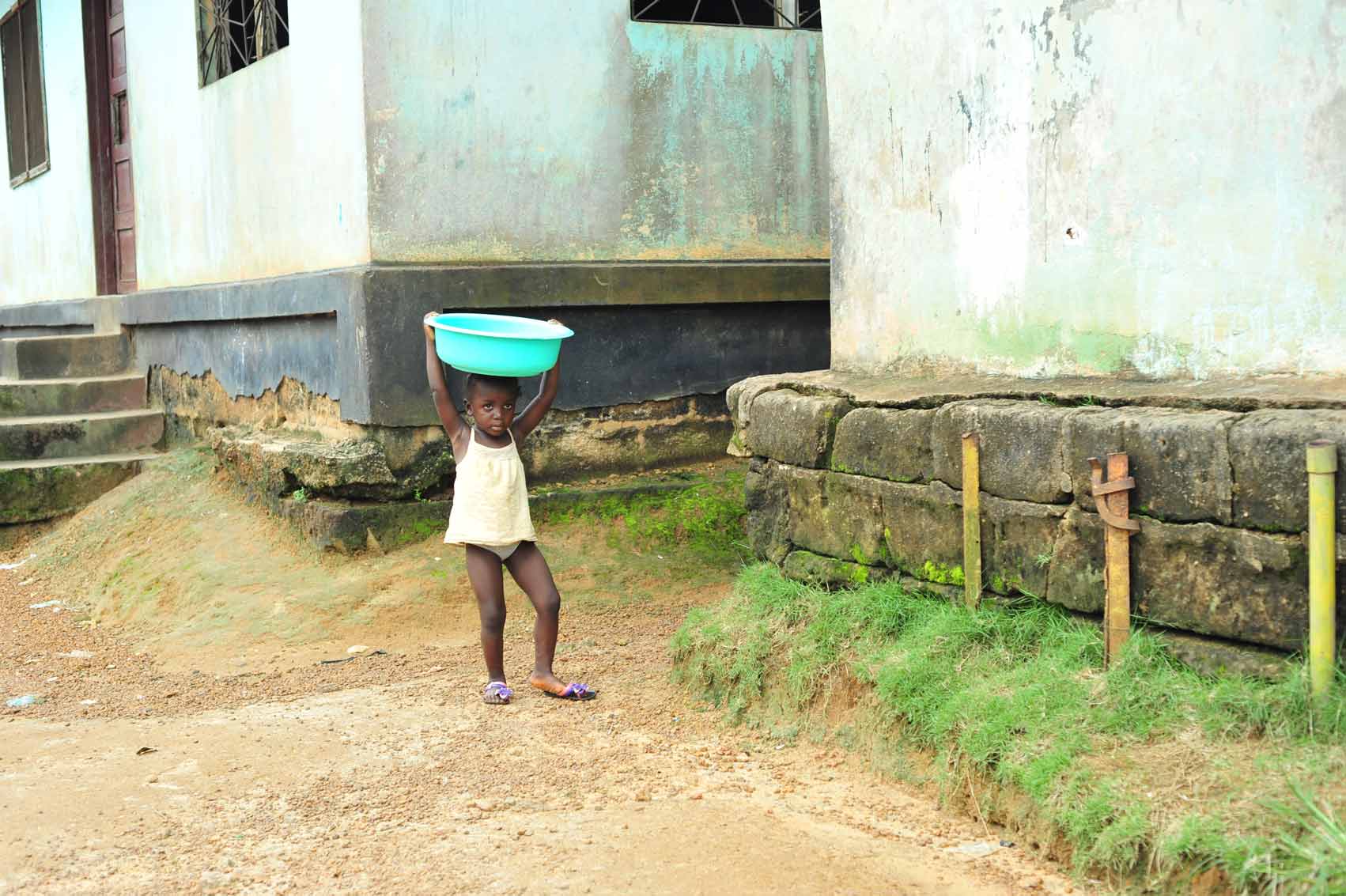
“Put everything you own in a bucket. Go and live in a field. Cook over an open fire on the ground. Collect and carry your water. Hang on by a thread during fourteen years of relentless conflict. Scrounge every day for food and try to ignore your hunger and the starvation of your children. That is what poverty looks like in Liberia.”
ANDY PERKINS, WORLD CHILDREN’S FUND LIAISON AND DIRECTOR OF THE WCF SUPPORTED FEEDING PROGRAM IN BUCHANAN, LIBERIA
The program in Buchanan aims to meet basic needs. It includes feeding, the opportunity for education, medical care, and essentials like clothing and shoes. Many children in Liberia are orphans. They have lost parents, siblings and relatives to war, militants, starvation and disease. Children often live with elderly grandparents or caregivers and households are comprised of numerous children cared for by older surviving relatives. The common denominator among all of them is the constant focus on food and survival.
Liberia’s civil wars completely obliterated the country’s economic infrastructure. The strategic destruction of war targeted the country’s physical infrastructure and destroyed Liberia’s power grid, telecommunications, ports, roads, and bridges. The chaos included looting and demolishing homes, schools, and hospitals. Today, most Liberian women cook over fire using wood or charcoal. Water is gathered from wells or rivers, as water no longer flows through most city pipes. Life is hard. When the sun goes down, the country goes dark. Cheap flashlights from China, candles and a few generators operate, assuming people have the cash to purchase fuel and batteries. Those who can find work often earn less than two USD per day. Unemployment rages. The average family unit consists of eight. The math simply does not work. The economy is sputtering. No jobs. The people say there are too many days in the month, too many mouths to feed, and not enough food or money to sustain and educate all the children in their care. This is Liberia. It is a land of suffering, but also a testimony of human resilience.
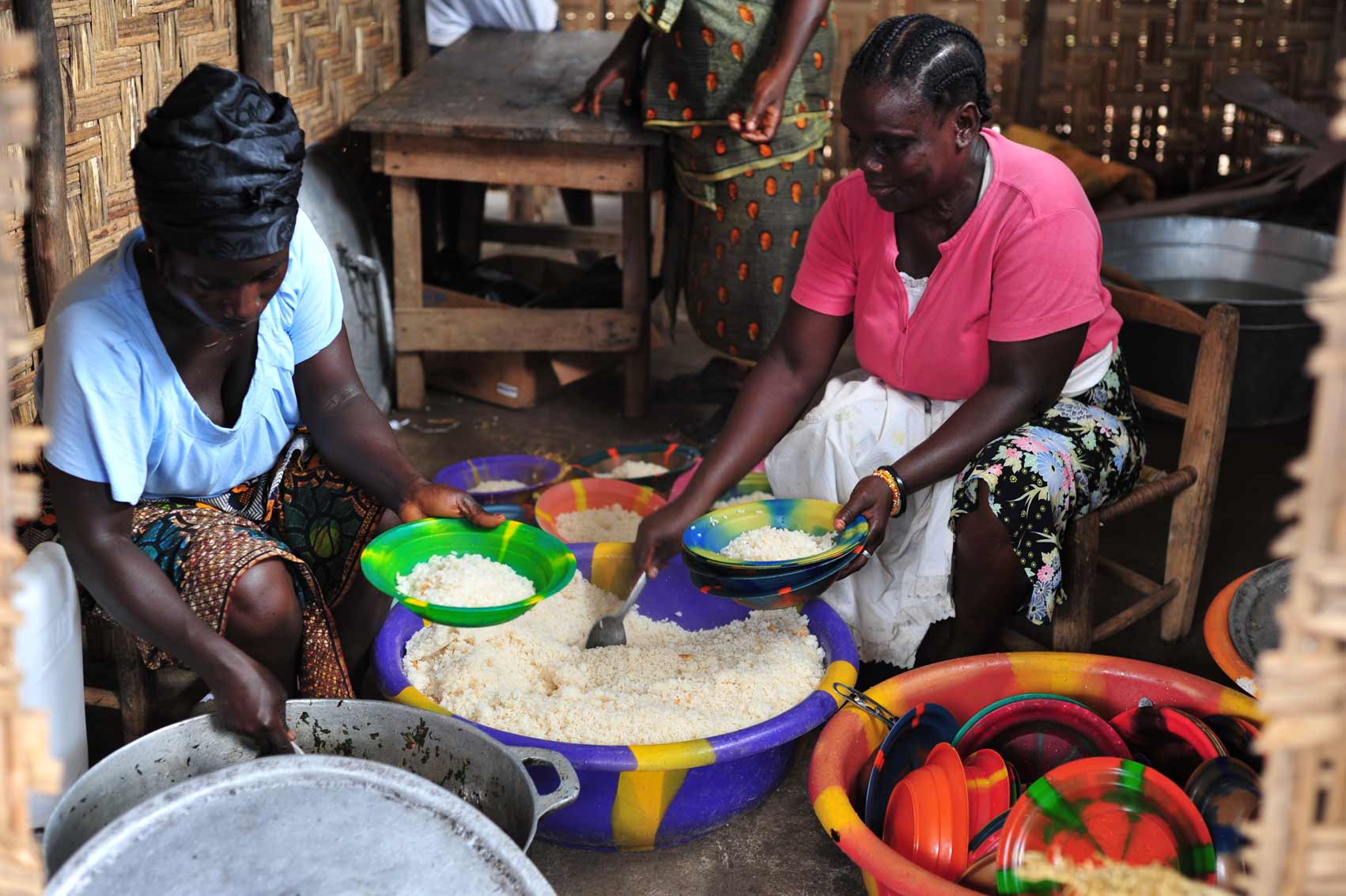
Although education is compulsory in Liberia, the country has one of the lowest primary school participation rates in the world. The burden of paying for required school uniforms, books, supplies and school fees make education a dream far beyond the reach of most children.
When a child becomes sick, families and elderly caregivers cannot scrape together the money needed for medication to treat common illness. Program administrators are vigilant when children report being sick or appear unwell. Your donor support creates access to medical treatment. Many young lives have been saved from preventable and treatable ailments including diarrheal disease, pneumonia, and malaria.
“It’s humbling to witness the mixture of anticipation and desperation of the children as they wait to receive a new piece of clothing. It takes several hours each day and often more than a single day of logistics at each of the feeding sites. You can see the fear in the faces of the newer students in the program if they don’t receive their items on the first day, as if they are wondering, am I really going a new dress, or a pair of sandals?”
VOLUNTEER WHO HAS HELPED DISBURSE CLOTHING AND SHOES
Sammy, an orphan being raised by his elderly grandmother received a life-saving hernia surgery. His grandmother earns less than one dollar per day and was unable to pay for the $300 surgery. Emma, who lives with her grandmother nearly died from chronic malaria but was taken to a clinic where she received medication and care. Children in the program often become sick because they do not have adequate sanitation facilities and access to clean water, which makes good hygiene practices challenging and contributes to the spread of infectious disease. Children who are suffering from intestinal illness and other diseases are taken to a nearby clinic where they can receive oral rehydration and life-saving treatment.”
Each year, children look forward to receiving new clothing. Nelly, who is in primary school, is one of many children enrolled in the program. Recently, she received new clothes for the first time in her life. Each year around the Christmas holiday, children gather at each feeding location. They wait in line enduring the heat, unwilling to step into the shade for fear of losing their place in line. The kids are noisy and boisterous. Each time the door opens, they jostle back and forth, pushing forward, hoping they will be in next group that enters the building to receive their Christmas clothes. The youngest children are called first, two to three at a time. The new clothes are stacked in piles by size. Little girls try on dresses, shorts and blouses. Boys sort through pants and t-shirts and every child receives a pair of sandals.
“It’s humbling to witness the mixture of anticipation and desperation of the children as they wait to receive a new piece of clothing,” says one volunteer who has helped disburse clothing and shoes. “It takes several hours each day and often more than a single day of logistics at each of the feeding sites. You can see the fear in the faces of the newer students in the program if they don’t receive their items on the first day, as if they are wondering, am I really going a new dress, or a pair of sandals?”
Children who are new to the program or who have outgrown their clothing from the previous year often arrive for their daily meal barefoot and partially clothed. After wearing the same few pieces of clothing every day for a year, apparel is dirty, torn and can be too small, or too large if passed down from an older sibling or relative. A young boy of about 11 years old stands in line waiting for lunch wearing nothing but snug underwear and an unbuttoned short sleeve shirt that is several sizes too small. He is not embarrassed. Other children take no notice. This is everyday life in Liberia.
“It is critical to get malnourished children in a feeding program as soon as possible to prevent issues like stunting. We want positive long-term outcomes for these children both physically and cognitively. Consistent nutrition allows children to attend school rather than scrounge for food and a full tummy creates energetic children who have the ability to focus on learning rather than hunger pangs.”
KATHRYN HESS, WORLD CHILDREN’S FUND INTERNATIONAL PROGRAM DIRECTOR
John, another child waiting for his meal, is small for his age. Like many children in Liberia, he suffers from stunting, which occurs from chronic malnutrition. It affects both physical growth and developmental progress. He lives with his grandmother in the Fairgrounds Community. His grandmother cares for a total of eight grandchildren, five boys and three girls. John loves the fresh greens he receives at lunch. He says he feels much better each day and has more energy since being enrolled in the feeding program. Although he is now receiving proper nutrition, the impacts of stunting that occurred earlier in his life will never likely be reversed.
“It is critical to get malnourished children in a feeding program as soon as possible to prevent issues like stunting. We want positive long-term outcomes for these children both physically and cognitively,” says Kathryn Hess, World Children’s Fund International Program Director. “Consistent nutrition allows children to attend school rather than scrounge for food and a full tummy creates energetic children who have the ability to focus on learning rather than hunger pangs.”
Ben has been enrolled in the WCF supported feeding program in the Fairgrounds Community since primary school. Both of his parents are deceased. He has been living with his grandmother, Sarah, since he was nine months old. He is the child of Sarah’s first-born son and she says her son died of starvation. Ben’s cousin, Harrison, has lived with Sarah since he was four years old. Harrison’s father was killed during the civil war. Both boys’ mothers left to find work in other regions of Liberia and have been missing for many years.
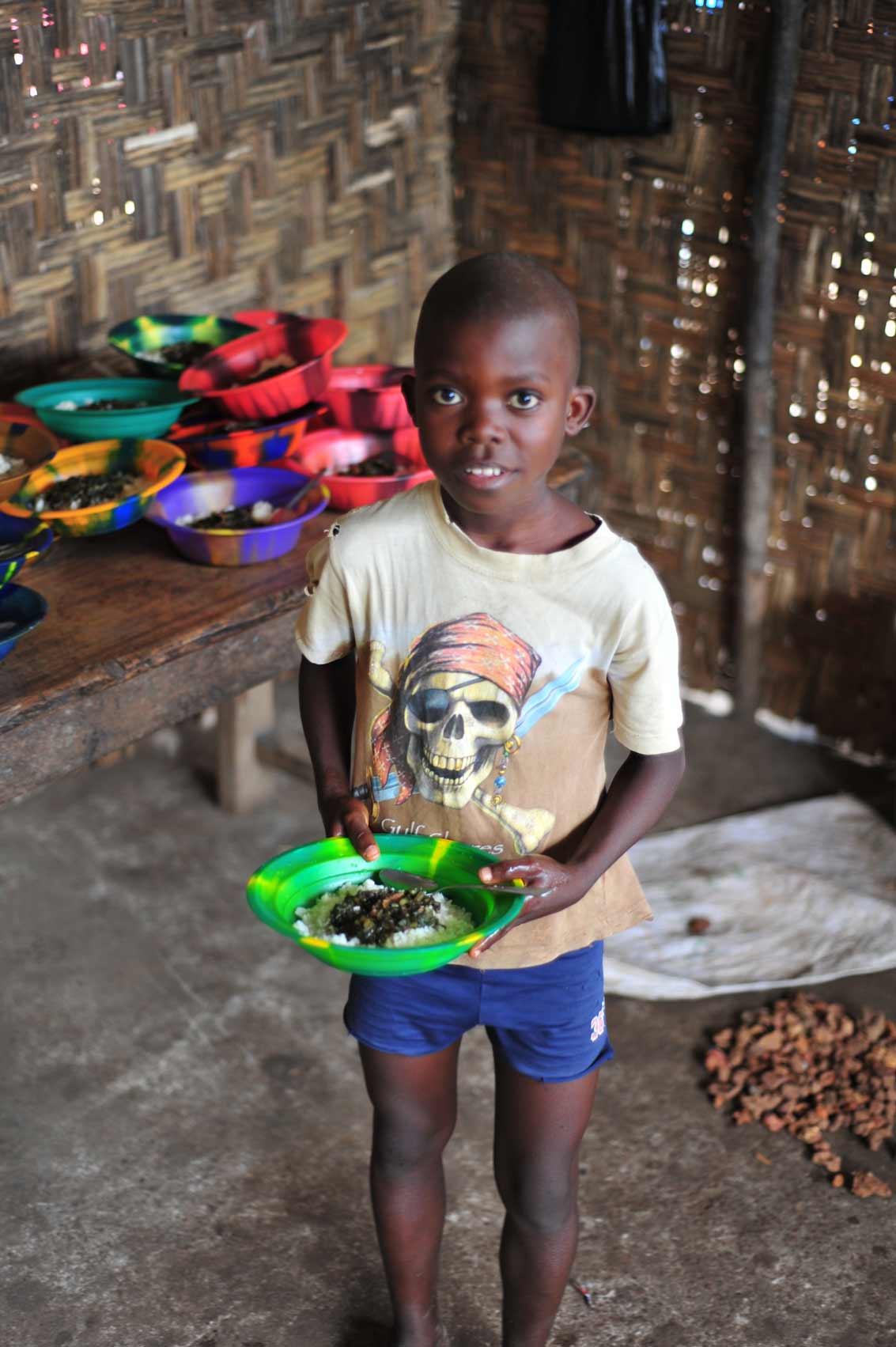
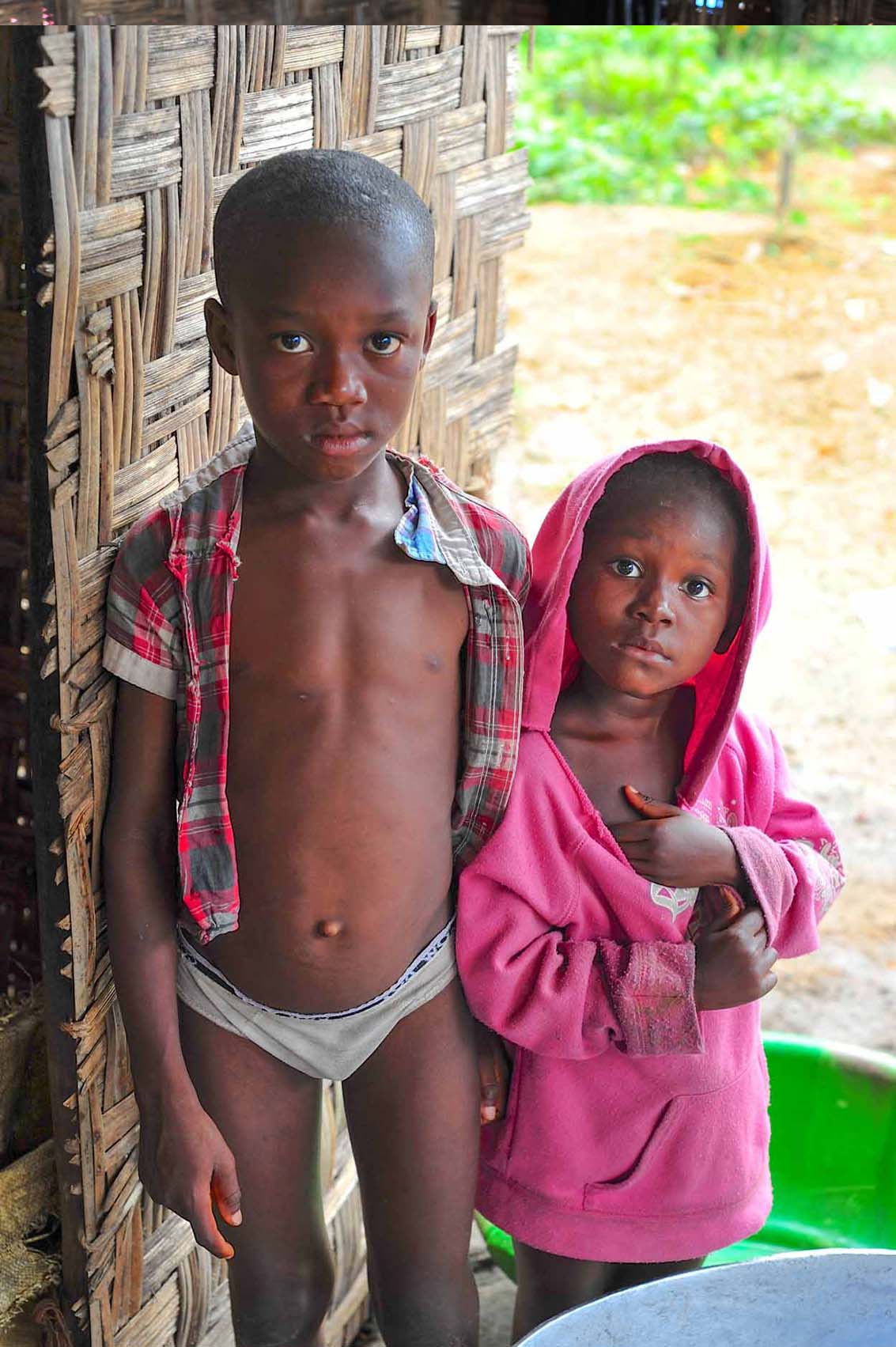
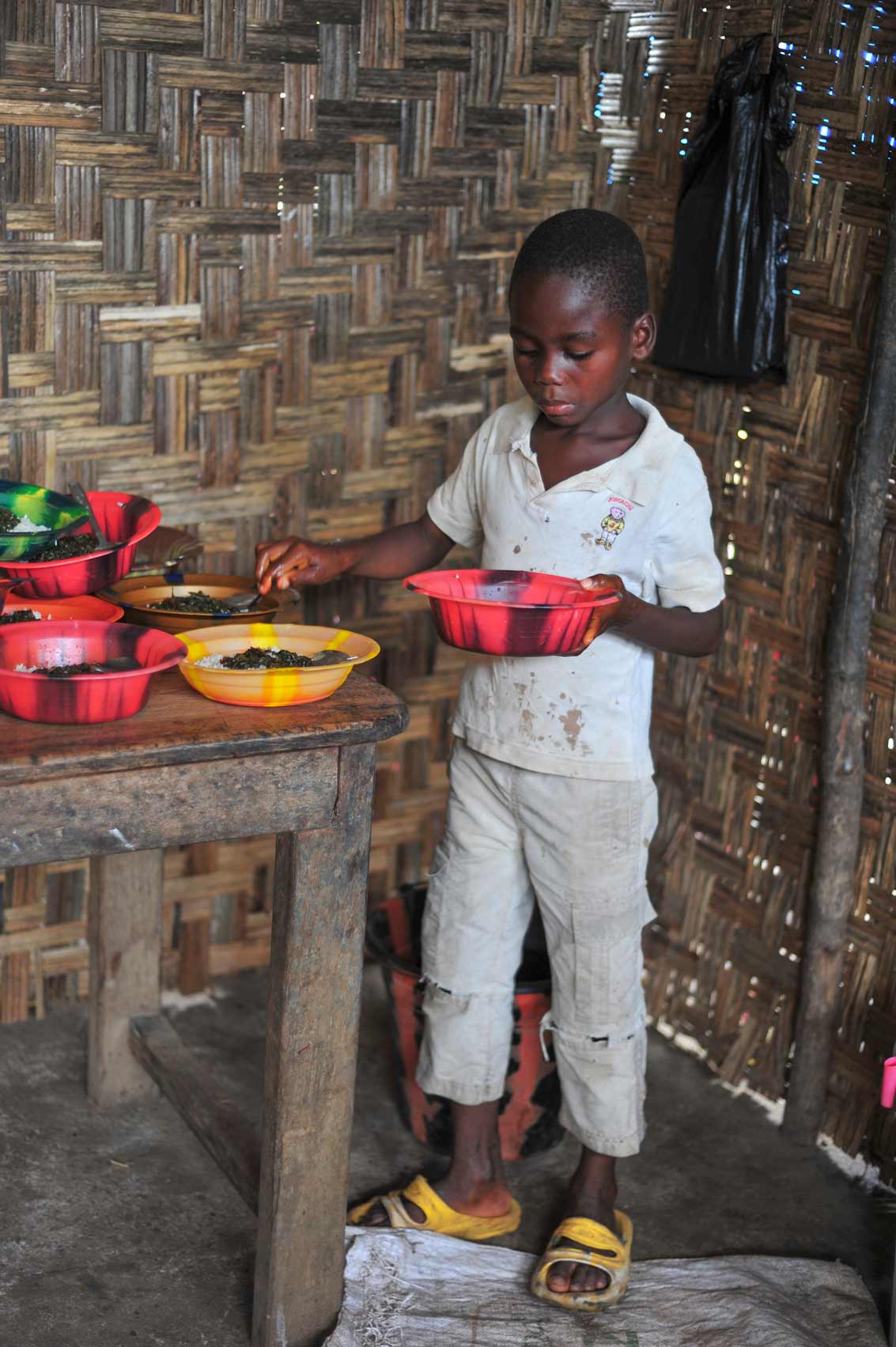
"We are making our way, with many thanks to the feeding available for the boys," says Sarah. "When we can’t eat, you always care and look out for us. It is by the Grace of God and the kindness of others we have made it this far."
Like most of the children in the feeding program, Ben and Harrison do not own toys and have limited possessions, but they gather old socks and tie them together to create a large, round knot, so they can play games of football.
When asked how many other children, siblings and cousins also count on his grandmother, Sarah, for survival, Ben pauses, looks up as if counting and finally answers, “There are plenty.”
He says on most weekends, no food is available. He looks forward to weekdays, like Monday, when he knows the feeding program is open and ready to welcome him. He says he enjoys the potato greens, which are mixed into a soup. He also loves the beans, palm butter and bitter ball (like Egg Plant) that are lovingly prepared by the nine cooks that serve on the staff. The meals vary and include fish, rice, beans, cassava, peppers, sweet potatoes, tomatoes, ginger, palm oil and various vegetables.
Ben has never been on airplane, but he can see them occasionally when he looks up in the sky. He says if he could fly away, he would go to America. He has heard it is a country with “a lot of food.”
Like many kids, he also mentions enjoying the rice meals that are dispatched by WCF via ocean container. The rice meals arrive at Monrovia’s port and are trucked into Buchanan. Each shipping container is filled with more than 250,000 meals that only require water to prepare. These highly nutritious rice meals feed children in the program during emergencies and are also disbursed to local orphanages, homes for the blind and elderly and others in desperate need.
During the Ebola crisis, WCF donors dispatched extra emergency shipments of meals that supplemented feeding for the children in the program and were also disbursed throughout the community. The former mayor of Buchanan, who was a schoolteacher during the Ebola crisis, credits the WCF rice meals in aiding his survival during the epidemic when he was out of work due to government mandated school closures. During the COVID-19 pandemic, WCF sent an emergency cargo container of rice meals to aid vulnerable families and children during lockdowns. WCF also routinely sends shipments of pharmaceuticals that are disbursed to more than eighteen clinics and hospitals in rural areas.
“These children live and survive in pitiful conditions,” says Allieu Barbue, who administrates the feeding in the Fairgrounds Community. “They are the future leaders of our nation. We are feeding, educating, and preparing them for service to others. I pray that every donor who is supporting this work in Liberia will be blessed.”
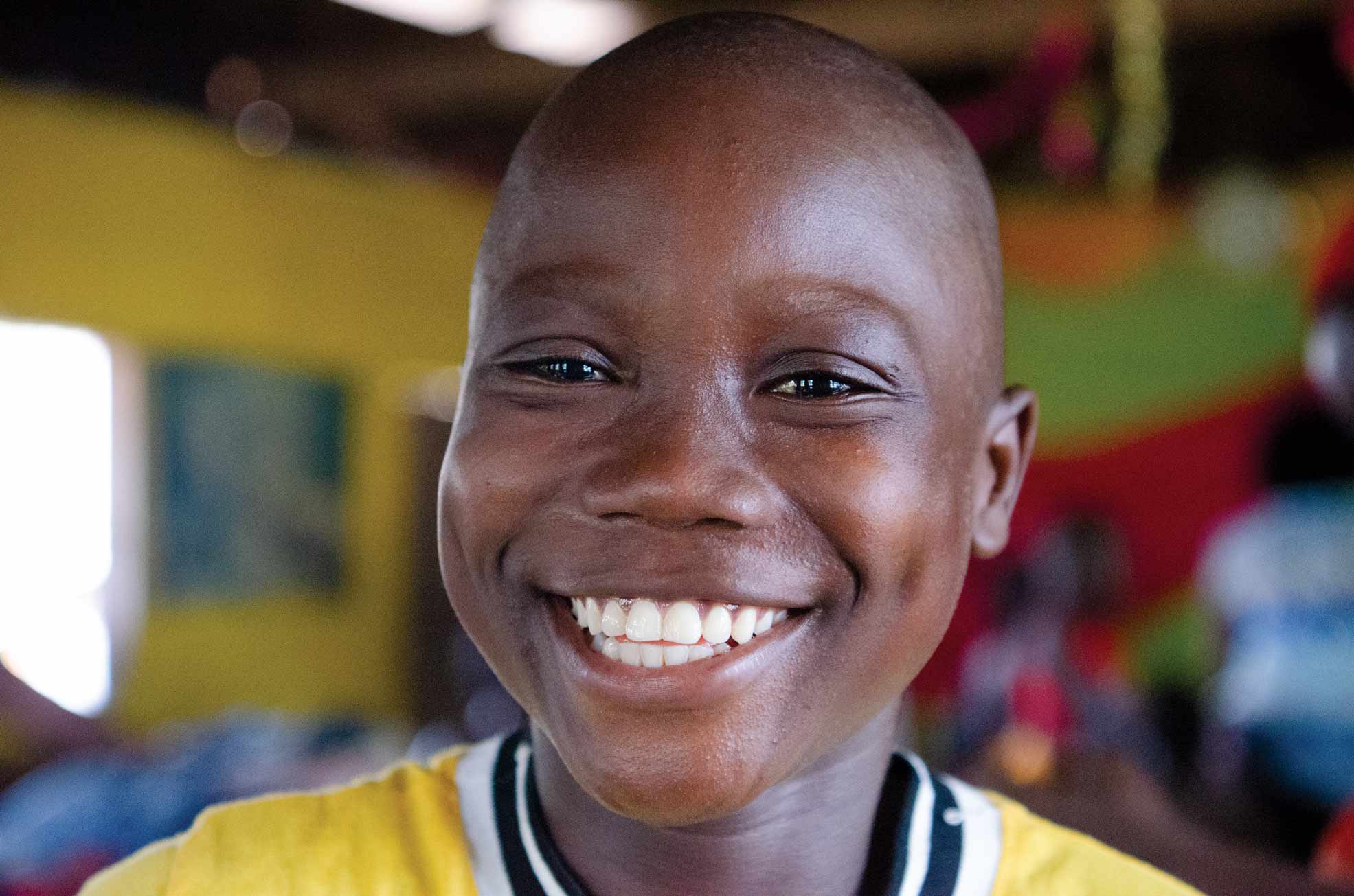
We love being able meet the needs of vulnerable and suffering children, like Sammy, Emma, Harrison, and Ben, who along with more than 1200 other children arrive hopeful each day to our WCF supported feeding program in Buchanan.
These daily nutritious meals provide strength and daily encouragement to these vulnerable children. Because of your support, these children in Buchanan are flourishing. Food, education, access to medical treatment, clothing and the love and care from program administrators create a profound impact in each of these young lives.
“Our donors may think that a few pounds or euros will not make a big difference and that the number of children in need out there is overwhelming. But every pound counts. At WCF, we can see just how far and wide small ripples travel and how many young people we help.”
LYNNE, WHO WORKS WITH WCF DONORS IN THE UK
“Our donors may think that a few pounds or euros will not make a big difference and that the number of children in need out there is overwhelming,” says Lynne, who works with WCF donors in the UK. “But every pound counts. At WCF, we can see just how far and wide small ripples travel and how many young people we help.”
